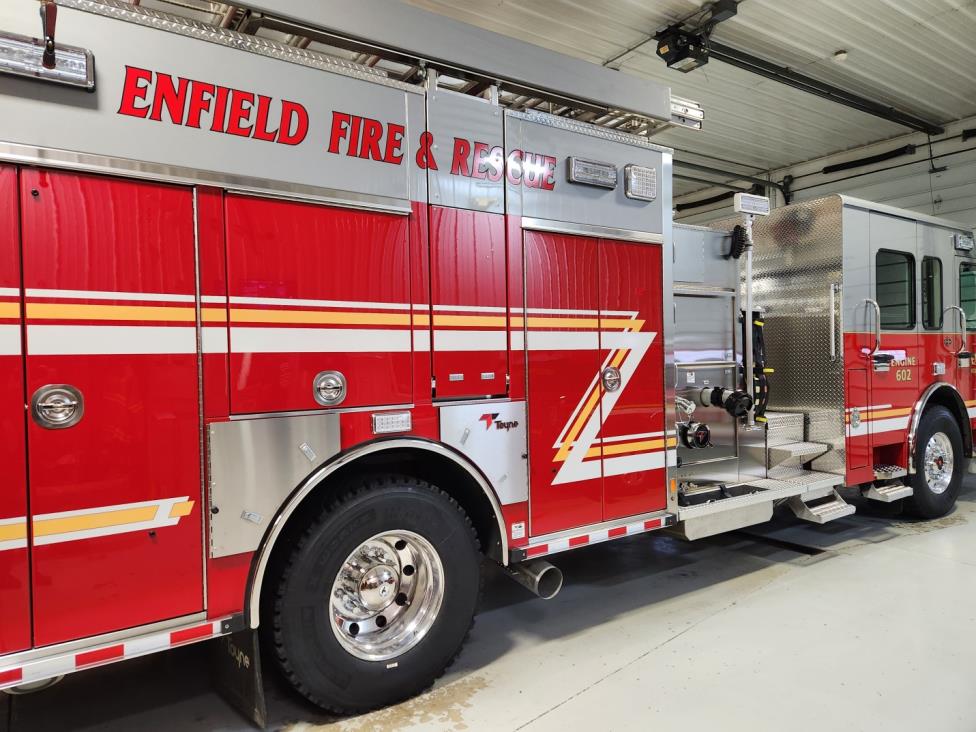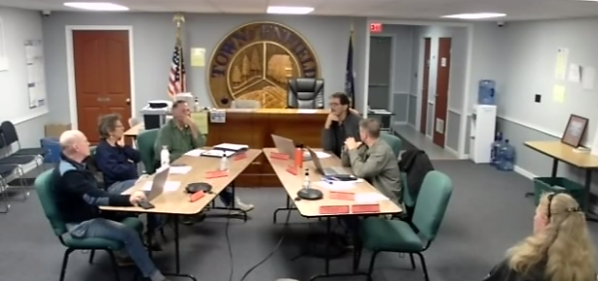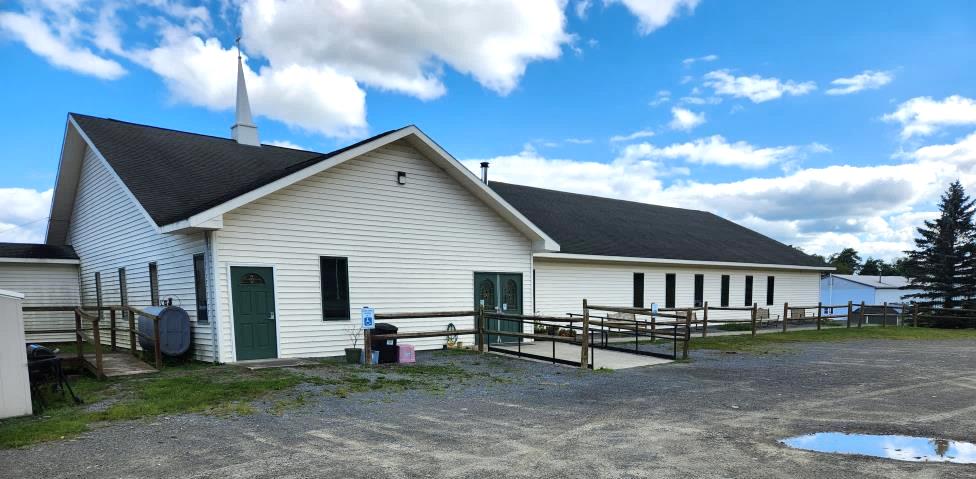Enfield Fire Commissioners ask we spread the pain for pricey pumper
Reporting & Analysis by Robert Lynch; October 2, 2023
It’s spanking new. It’s state-of-the-art. And it’s the pride of the Enfield fire house fleet. But it’s also unpaid for. And unless something’s done, and done soon, it could break the Enfield taxpayer’s back.

It’s a newly-purchased pumper engine, a truck that the Enfield Volunteer Fire Company (EVFC) ordered perhaps two years ago amidst the pandemic. It then waited… and waited for delivery. The apparatus finally arrived late last spring and quickly supplanted a 21-year old engine that Fire Chief Greg Stevenson says has been bought by a fire company in central Pennsylvania.
The new truck’s manufacture has been fraught with supply-chain delays and cost overruns. And it comes to Enfield at more than six figures above its initially-budgeted $700,000 quote. And only now, the newly-created Enfield Board of Fire Commissions, the governing body for the Enfield Fire District—the one that took over fire governance from the Town Board in August—must figure out how best to pay off the pumper’s staggering debt, $825,000.
“I just don’t see a way out of this if we don’t bond,” Jim Mathews, the Board of Fire Commissioners Chair, told his Board’s Monday, September 25th meeting. “I think we either bond or we start cuttin.’”
That night, the Board of Commissioners chose to go to bond and not to cut. With Mathews the driving force, and with the four other Commissioners following largely in lockstep, the Board voted unanimously to place before Enfield voters—in a special election now scheduled for Halloween—two bonding resolutions.
The first resolution would bond a 2020 Fire Company tanker truck still on loan with $220,000 outstanding. It would spread the tanker’s bonding over five years. The second measure would finance the new pumper for up to 20 years, with a total principal set at $830,000. Together the resolutions would incur (first-ever) long-term debt for the Enfield Fire District of $1.05 Million. The measures would require the Fire District to first buy both vehicles from the EVFC. Enfield has never bonded the purchase of a fire truck before.
The decision to bond came during a nearly three-hour Fire Commissioners meeting Monday, a session dominated by financial matters. In an equally-important vote, Commissioners handed up a $389,736 Preliminary Budget for 2024. The budget would raise fire service spending by only 3.2 per cent over the 2023 budget. The current year’s budget was the product of 2020 negotiations between the Town Board and the EVFC as part of their expiring three-year contract.

Yet baked into the new budget cake is the assumption that voters will, indeed, bond both those trucks. Were they to defeat the resolutions—and assuming the trucks were still kept in service—the added debt payments could tack about $120,000 onto the Preliminary Budget’s total. The change would propel estimated annual Fire District spending to more than $500,000 and jump the tax rate for fire service up 30-35 per cent.
“A vote for bonding will likely mean lower taxes for the typical Enfield property owner,” Mathews told Monday’s meeting prior to the Commissioners’ vote. “Voting for bonds means lower taxes and continued high-quality protection. Voting against bonds means higher taxes or less safety.”
The Chairman estimated that bonding would contain the cost of fire protection for the typical Enfield taxpayer to $246 next year, whereas a budget without bonding could propel the cost to as much as $317.
Of course, any keen observer can see the fault line in the Chairman’s central argument; namely that bonding cuts taxes. It may cut tax bills next year and for those in each of the next several years. But bonding would not likely reduce tax outlays in the long-term, over the total life of each truck’s indebtedness. Mathews acknowledged that fact.
“We must be clear-eyed. Bonding is not a magic wand that makes the cost go away. It just spreads the payments out over more years,” the Chair explained. “But it’s almost a 100 per cent certainty that if we do not bond, we can’t pay the bills. Bonding is the way out of this.”
Of course, to those who might disagree, bonding also means kicking the fiscal can down the road; easing the pain of today by compounding it tomorrow. And Mathews concedes that his District’s “tomorrow” is far from trouble-free. Other apparatus will likely need to be retired by late-decade. As much as $2.3 Million in new debt could crop up between 2029 and 2033. And that’s what it would cost at current, pre-inflated prices.
Members of Enfield’s Board of Fire Commissioners are still finding their sea legs. Each Commissioner holds nothing more than a five-month interim appointment. The Enfield Town Board named the five in August as placeholders of sorts pending the Fire District’s first-ever annual elections this December. On December 12th, Enfield voters will decide whether some of those the Town Board named will remain or be replaced. At least one of those appointees, Enfield Highway Superintendent Barry “Buddy” Rollins, proved controversial at the time of his appointment. Rollins has avoided making waves since his selection, and the appointment controversy appears to have abated.
Chairman Mathews’ insistence on fire truck bonding stems from the bright-line he’s drawn regarding the Fire Tax. This year’s fire protection rate is about $1.52 per thousand assessed valuation. Last year it was a bit more. But Mathews wants it to go not much higher:
“I personally will not support raising taxes to $2.07 (per thousand),” the Chairman told the meeting, his upper estimate projected as to where the tax rate would go if the trucks weren’t bonded. “I will not put forth a tax increase the $2.07, even if it’s temporary for one year. I couldn’t do that because we have other options.”
Fire Commissioner Marcus Gingerich was the most skeptical of those at the meeting table that night.
“Are we just pushing ourselves into a bigger problem later on?” Gingerich asked his colleagues.
“I share, Marcus, your discomfort with the bonding possibly becoming a millstone around our necks over the long-term,” the Chairman responded. “I get that. But it does give us the opportunity to spend a few years looking for other sources of revenue.”
Mathews sees his Fire District’s long-term lifeline coming from outside grants, those from government and from other sources. But as the skeptic might caution, applying for grant money is the easy part; securing that grant is far more difficult.
“We have from now until 2029 to identify new sources of revenue,” Mathews challenged his Board. He eyed those future, late-decade equipment purchases as the next big obstacle.
But how Halloween became chosen as the day for Enfield’s $1.05 Million Special Fire District Election stands as a story in itself. It’s one deserving of scrutiny in matters not so much of substance, but rather of procedure. The election date’s selection gives us insight into how this nascent Commission and its Town-chosen attorney, Brad Pinsky, do business; how they treat the basic rules of Parliamentary Procedure, the dictates of statute, and most importantly, the expectations of a skeptical Enfield electorate who may insist on that quaint principle that public matters get decided only at public meetings, and not on the fly while hidden behind the public’s back.

At Monday night’s meeting, Fire Commissioner Geoff Hollister introduced the bonding resolution. It was a bare-bones motion, scripted with anything but precision. It lacked specificity or any inclusion of a referendum date.
“I’m going to make a motion that we bond—that we go for bonding both trucks.” Those were the words Hollister used to move his bonding resolution to the floor.
Chairman Mathews seconded. Mathews invited discussion. None was offered. Hollister’s motion quickly passed.
Though an election date was never specified at the meeting—which it obviously should have been, and Hollister’s motion should have included a set date—Mathews had implied by his words not just once, but twice earlier in the meeting that he expected voters to decide bonding in the same December 12th election when the new Commissioners themselves would be chosen. Nothing more was said.
Then, two days later, Wednesday, September 27th, a Town Clerk’s advisory, a blast message posted on Enfield’s Town website, proclaimed that both bonding measures would be decided at a Special Election on October 31st. The date had never before been stated publicly, nor voted on by the Commissioners. It was a total surprise. This writer’s jaw dropped.
“It was my impression at the meeting that the two votes were to be held concurrently; for the Commissioners and for bonding,” this writer, Councilperson Robert Lynch, promptly wrote the Commissioners and Clerk Mary Cornell Wednesday evening. “Their dates cannot be changed on someone’s whim. I know you commissioners had no legal guidance that night. But specificity is demanded in things like this.”
This Councilperson concluded, “Enfield voters will not react well to this. I know I don’t. The time is too short. They feel something’s being pulled over on them. On Halloween, at that.”
What followed from this Councilperson’s inquiry was a pointed email rebuttal from attorney Pinsky, the substance of which will not be detailed here as this writer does not know whether Pinsky intended its publication. However, in summary, the attorney defended the worthiness of the referendum and the legality of the notice given. He also shared his belief that the actions taken regarding scheduling would withstand any possible legal challenge.
However, Brad Pinsky advanced one further point, a position that to some may strain credulity. Pinsky equated the belated insertion of the election date with “all the introductory whereas language,” otherwise “missing” from Hollister’s motion. Then, a few moments later, in a subsequent email that I conclude he intended for the record, Pinsky said this:
“No action was taken last night [actually two nights earlier]. All that was taken was to send the matter to the voters. There is no action other than agreeing to send the matter to the voters. The voters have the final say.”
In essence, this writer assumes that in the attorney’s opinion, operational details—including an election’s time, place and manner—whether included or omitted, require no formal action in matters of this sort.
Both the Town Board and the Board of Fire Commissioners had fully expected Brad Pinsky would attend twice-monthly Commission meetings to help organize the Fire District and train its Commissioners. Pinsky is charging Enfield $15,000 for his services. But Monday’s marked the third straight Commissioners’ meeting where the attorney had been absent. And on the following Thursday, a source revealed why the Halloween date had never been brought to anyone’s attention Monday night.

That source reports that the October 31st election date first emerged in a call Pinsky made to Fire Commission officials in the wee hours of the next day, on Tuesday morning, as the attorney phoned in from somewhere in Italy. Pinsky maintained that Halloween was the only day that would work to enable the referendum’s results to be known by the time Commissioners would need to finalize their budget November 4th.
Yes, this will be a “snap” election for us in Enfield. And there’s another wrinkle. Because the Enfield Community Council had other events already booked for its Community Center on Halloween, the election will need to be held at the Enfield Fire Station instead.
So the two trucks’ financing proceeds to a bonding vote. The referendum’s outcome stands uncertain. And this march to that Special Election has already become tarnished a bit by the blunt-edged, “never-mind-the-details” procedures that some may see as playing fast and loose with the law and the public trust. The Fire Commissioners, themselves, should be blamed much less than those who guide them—that is, when that helping hand finds itself ever extended.
“We need guidance. We don’t have it,” Geoff Hollister pleaded at one point during Monday’s budget meeting. In drafting its document, Commissioners could only take a wild guess at Workers’ Compensation costs for coverage New York mandates volunteer firefighters receive. According to one Commissioner, Town Supervisor Stephanie Redmond had said that attorney Pinsky would look into workers comp. Pinsky reportedly said that he would not. No one knew for sure. The attorney that night was six time zones away.
“The time frame that we’ve been given to do this is really becoming very difficult to actually get stuff done,” Commissioner Hollister observed as he began to plow through budget lines in a way that often seemed like he sat on a ship adrift in the ocean. Hollister wasn’t alone.
“It’s not great timing,” Commissioner Robyn Wishna echoed. “But it is what it is. We are trying to do the best we can.”
###

